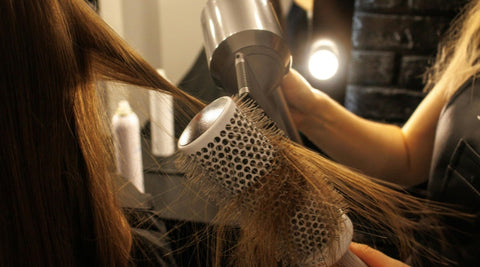When you hear about supplements or beauty routines, chances are you’ve run into the debate: biotin or collagen? The decades-long contest between biotin and collagen must have confused a lot of people about which one is “better” for hair and skin.
Let Everything Hair break down what biotin and collagen actually are, how they function in your body, what the science says about biotin vs collagen for hair and skin, and, ultimately, whether biotin or collagen is better for your specific needs.
What Are Biotin and Collagen?
Biotin
Biotin, also called vitamin B7 (or vitamin H in older literature), is a water-soluble vitamin. It participates as a cofactor for carboxylase enzymes in metabolic pathways, helping your body convert fats, amino acids, and carbohydrates into usable energy.
Because biotin is water-soluble, the body does not store it in large quantities; the excess is excreted in urine, which means regular & consistent intake is required.
Signs of a biotin deficiency may include hair thinning or hair loss, brittle nails, skin rashes, or dermatitis. However, full-blown biotin deficiency is relatively rare in generally well-nourished populations.
Collagen
Making up a large part of connective tissues throughout your body, collagen is a natural & structural protein found in skin, hair follicles, tendons, bones, and cartilage. In general, collagen helps provide firmness, structural integrity, and elasticity.
Your body naturally produces collagen by combining amino acids (such as glycine, proline, and hydroxyproline) in cells called fibroblasts. But as you age, collagen production declines and environmental elements, like UV exposure, smoking, and inflammation, break down collagen faster.
Collagen supplements are often hydrolysed (broken down) into peptides so that they are more easily absorbed when taken orally.
Biotin vs Collagen for Hair
When comparing biotin vs collagen for hair, a few distinctions are important. Depending on your target, specific needs and different health conditions, biotin and collagen will have different effects on your body.
Is Biotin or Collagen Better for Hair Growth?
-
Biotin supports the activity of enzymes involved in synthesising keratin, the protein that makes up hair strands. In individuals who are deficient in biotin, supplementation or biotin conditioner may reduce hair shedding and boost hair strength.
-
Collagen’s role in hair is more indirect: by supporting the health of connective tissue around hair follicles and providing amino acid building blocks, it may contribute to healthier scalp structure. Some sources argue that collagen supports hair structure and reduces breakage.
So, we’ve got the final answer, which depends on the underlying cause. If a biotin deficiency is present, biotin may be more directly effective. If the goal is structural support and long-term hair and scalp health, collagen (or a combination of collagen and biotin) might offer more benefit. Based on your needs, pick hair care products like biotin shampoo or collagen hair treatment.
Biotin vs Collagen (Hair Strength, Thickness, Loss)
In cases of hair thinning related to nutritional deficiency (including biotin), biotin supplementation may help reduce hair breakage and thinning. While collagen supplementation, like collagen serum, has been studied more robustly for skin benefits, its effects on hair weren’t made clear as an ultimate choice for growth.
Because hair growth is a long, cyclical process, it’s difficult to attribute major improvements solely to one supplement, especially over short timeframes.

Collagen vs Biotin for Skin
When the question shifts to skin, we consider collagen vs biotin for skin in more detail.
Collagen is a key component of the dermal matrix, helping skin maintain firmness, elasticity, moisture retention, and smoothness. As one ages, collagen loss contributes to sagging, wrinkles, and skin thinning. Also, collagen taken orally, like single collagen serving sachets for daily use, is broken down into amino acids and peptides for easy absorption.
Because biotin supports metabolic enzymes that help produce fatty acids and proteins, it can contribute to skin health, especially if there is a deficiency. However, evidence that biotin supplementation (in individuals without deficiency) improves skin appearance (e.g., reduced wrinkles, increased firmness) is weak or lacking.
Thus, for collagen or biotin for skin, collagen tends to be more directly supported by evidence in improving skin appearance, particularly in ageing or structural concerns. On the other hand, biotin is more relevant in deficiency states.
Then, Is Biotin or Collagen Better?
Neither is categorically “better” across all cases; it depends on your goals (hair growth, skin firmness, etc.), existing deficiencies, diet, age, and other health factors.
Collagen has stronger evidence for improving skin hydration and elasticity and reducing signs of ageing. Biotin’s benefits for skin are more limited and often tied to deficiency correction. Because both nutrients are absorbed and metabolised, their ultimate effects depend on your overall diet, baseline health, and how your body processes amino acids or vitamins.
Nurture Your Beauty from the Inside
In the debate between biotin and collagen, there’s no clear universal winner. For hair, biotin carries stronger relevance when deficiency is a factor, while collagen’s structural support can complement longer-term hair wellness. For skin, collagen generally has more robust evidence for improving appearance metrics.
In some cases, dermatologists suggest combining both, ensuring your diet and health support both pathways, which may be the wisest approach given current science.




